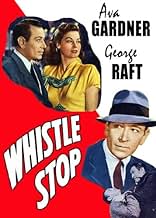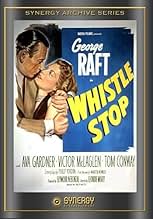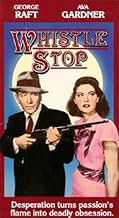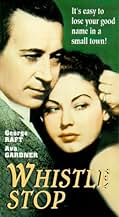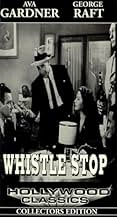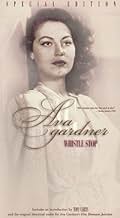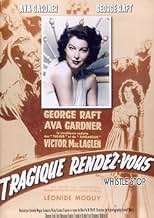IMDb RATING
5.5/10
1.4K
YOUR RATING
After beautiful Mary returns home to her "whistle stop" home town, long-standing feelings of animosity between two of her old boyfriends leads to robbery and murder.After beautiful Mary returns home to her "whistle stop" home town, long-standing feelings of animosity between two of her old boyfriends leads to robbery and murder.After beautiful Mary returns home to her "whistle stop" home town, long-standing feelings of animosity between two of her old boyfriends leads to robbery and murder.
Ewing Miles Brown
- Townsman
- (uncredited)
Jack George
- Joe - Barber Shop Customer
- (uncredited)
Robert Homans
- Sheriff
- (uncredited)
Broderick O'Farrell
- Barfly
- (uncredited)
Jeffrey Sayre
- Fran's Dance Partner
- (uncredited)
- Director
- Writers
- All cast & crew
- Production, box office & more at IMDbPro
Featured reviews
Ava Gardner looks delectable and the character actors are wonderful in this preposterous soaper with noirish tendencies. No hint is ever given why Ava should fall for such a schmuck as portrayed by Raft. Why she should dally with the sort of weasel as portrayed by Tom Conway is a head scratcher as well. Perhaps they're the best that this one track town can offer in the way of available men. One would think that Chicago, the town Ava leaves to return to this burg, would present a more palatable platter of gents. But, thought doesn't play much of a part in this story. It is improbable, turgid and despite the fact that a train rolls through town, goes nowhere. There is some interesting camera work and nice lighting. The secondary actors are the only reasons to keep watching this bore. Well, that and the various shots of dreamy-looking Ava attired in her robe, nightgown and clinging dresses. Ultimately, though, this flick can be tersely summed up as being about a mope and a dope.
There was a time when the studio system had the actors and actresses like Ava Gardner and Victor McLaglen making about 5 films a year. Actors and actresses in the studio system worked hard and some films never became brilliant but did entertain audiences. This film was on my compact disc with three other fair films with other actresses like Jane Wyman, Marilyn Monroe in a small role but still, and Joan Crawford in "Rain." One cannot stop looking at Ava Gardner playing Mary, a girl who returns to her small town life from the big city of Chicago which she left in a mystery. She returns to her boyfriend who is unmotivated gambler and meets a rich businessman who takes a liking to her. Ava steals this film hands down. It's not a great film but it's more about characters and story lines than anything else.
Whistle Stop (1946)
The style is pure film noir but the plot is not. A curious blend at the time of the first noirs at the end of WWII (this one is actually copyright 1945). It has two strong headliners, though some might argue this--George Raft is always a bit less than he wants to be and Ava Gardner is simply young and charming, before her great later roles. It does have a great idea--a beautiful woman has returned to the simple little town where she grew up wanting to see if her true love was still what she thought.
And so Gardner steps off the train at the whistle stop wearing furs, and mentioning her rich lovers left behind in Chicago. She looks at George Raft and thinks he's still a handsome guy, maybe it'll work. But she soon learns Raft is still a loser. And that another guy in town, with lots more money, still has the hots for her. It takes about one scene to switch her game plan.
It's called "Whistle Stop" because it's such a small town on the train line the train doesn't stop unless a signal is put out that a passenger is waiting. Then it blows its whistle and stops. (It also blew its whistle when it had a passenger, Gardner, who wanted to get off, so the whole town, if listening, would say, "Oh, the train's stopping." This becomes important later when Raft gets involved in a way to both make some quick major cash and get even with his rival.
But I should finally say the plot and direction are horribly put together. After awhile the four of us watching were speaking out, after a half hour of really rapt silence, saying, "What?" Or, "Now way." That is, the most improbable flip-flopping of emotions and inconsistent characters keeps adding up until you just can't quite get it. What's worse is it was all really avoidable with some minor thinking. You get the sense that maybe it got re-edited after shooting was done, maybe to create a different flow, or shorten it, or change the ending, and they just didn't have the pieces that needed to make it make sense. Whatever the reason, all these heartfelt, gritty, intense situations fall slightly flat. Just slightly--the movie is sort of watchable--but you have to like this period of movies to see all the great things going on otherwise.
Like the filming--great noir-ish darkness and high contrast, wonderful tight framing, and a few shots in a few scenes that you could study for their simple effectiveness. This is what keeps it going. And the whole scene is great, the little town, the back rooms and odd characters, the family at home. None of it is fully fleshed out, but it's all there to look at at least.
And a last point--the only copy I could find was streaming on Amazon, and it's a terrible print--there must be a hundred little gaps and jumps where both the sound and picture skip a second. Beware of that. Too. But Ava, well, she's got a career ahead of her, and she brings her scenes alive.
The style is pure film noir but the plot is not. A curious blend at the time of the first noirs at the end of WWII (this one is actually copyright 1945). It has two strong headliners, though some might argue this--George Raft is always a bit less than he wants to be and Ava Gardner is simply young and charming, before her great later roles. It does have a great idea--a beautiful woman has returned to the simple little town where she grew up wanting to see if her true love was still what she thought.
And so Gardner steps off the train at the whistle stop wearing furs, and mentioning her rich lovers left behind in Chicago. She looks at George Raft and thinks he's still a handsome guy, maybe it'll work. But she soon learns Raft is still a loser. And that another guy in town, with lots more money, still has the hots for her. It takes about one scene to switch her game plan.
It's called "Whistle Stop" because it's such a small town on the train line the train doesn't stop unless a signal is put out that a passenger is waiting. Then it blows its whistle and stops. (It also blew its whistle when it had a passenger, Gardner, who wanted to get off, so the whole town, if listening, would say, "Oh, the train's stopping." This becomes important later when Raft gets involved in a way to both make some quick major cash and get even with his rival.
But I should finally say the plot and direction are horribly put together. After awhile the four of us watching were speaking out, after a half hour of really rapt silence, saying, "What?" Or, "Now way." That is, the most improbable flip-flopping of emotions and inconsistent characters keeps adding up until you just can't quite get it. What's worse is it was all really avoidable with some minor thinking. You get the sense that maybe it got re-edited after shooting was done, maybe to create a different flow, or shorten it, or change the ending, and they just didn't have the pieces that needed to make it make sense. Whatever the reason, all these heartfelt, gritty, intense situations fall slightly flat. Just slightly--the movie is sort of watchable--but you have to like this period of movies to see all the great things going on otherwise.
Like the filming--great noir-ish darkness and high contrast, wonderful tight framing, and a few shots in a few scenes that you could study for their simple effectiveness. This is what keeps it going. And the whole scene is great, the little town, the back rooms and odd characters, the family at home. None of it is fully fleshed out, but it's all there to look at at least.
And a last point--the only copy I could find was streaming on Amazon, and it's a terrible print--there must be a hundred little gaps and jumps where both the sound and picture skip a second. Beware of that. Too. But Ava, well, she's got a career ahead of her, and she brings her scenes alive.
George Raft and Ava Gardner seem like a surefire hit but somehow it just doesn't turn out that way. The relationship between the two seems contrived. I think there may have been screen writing problems or something. Taking a decent plot and a good idea for a story and weighing it down and forcing it. It always seemed like there was something missing. But have no fear, Victor McLaghlin saves the show. His character is not only the only one that is interesting enough to care about but McLaghlin gives a really wonderful performance and one well worth watching. I wish the entire movie had been about him with Raft and Gardner as the peripheral characters.
Without Victor McLaghlin I give the film 3 or maybe 4 out of 10 but his screen time brings it up to a fairly solid 6 out of 10.
Without Victor McLaghlin I give the film 3 or maybe 4 out of 10 but his screen time brings it up to a fairly solid 6 out of 10.
Other than Ava Gardner's beauty, there isn't a lot here. We have the usually restless George Raft character, hanging around a small town. Apparently he has some earlier dealings with Gardner and when she crosses into his life, there's some pain involved. She is angry with him for his lack of motivation. Nevertheless, there is a bit of sexual tension. Personally, if she is the package, he should change and change quickly. She also has some baggage. How much we don't know, but it's obvious that she has sold out a few times herself. It all gets down to Victor McGlaglen getting his revenge on a guy he owes, who also is a sort of sugar daddy to Gardner. Things get pretty heavy handed and are resolved in rather an odd way. It is somewhat satisfying, not terrible, but both actors have done better work.
Did you know
- TriviaMack Gray, who plays the replacement bartender, was an old friend of George Raft and his film career consisted mostly of cameos in Raft films.
- Quotes
Josie Veech: Oh, sure, the best time to start looking for a job is 8 o'clock at night, and if you do a good job of looking, you won't get home 'til morning, and the best place for looking is every beer joint and pool hall on Main Street.
- ConnectionsEdited into Mobster Theater: Whistle Stop (2022)
- SoundtracksOnce Again
(uncredited)
- How long is Whistle Stop?Powered by Alexa
Details
- Runtime
- 1h 25m(85 min)
- Color
- Aspect ratio
- 1.37 : 1
Contribute to this page
Suggest an edit or add missing content

